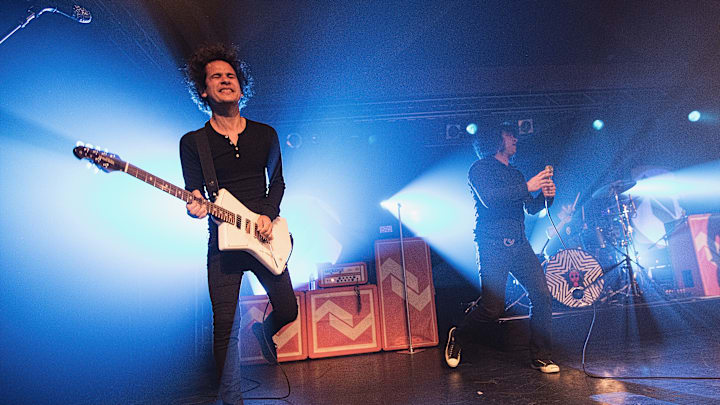[NOTE: We fully realize the artist's name is truly written as "Omar Rodríguez-López," but for ease of searchability on common search engines, accent marks have been removed.]
Music is a dynamic art form that thrives on the interplay of creativity, innovation, and inspiration.
As ethnomusicologist John Blacking noted: “The function of music is to enhance in some way the quality of individual experience and human relationships; its structures are reflections of patterns of human relations, and the value of a piece of music as music is inseparable from its value as an expression of human experience...”
Musicians draw from a wide range of influences to shape their unique sound, and Omar Rodriguez-Lopez is a prime example of an artist whose musical journey has been deeply shaped by a diverse array of influences. As the driving force behind bands like The Mars Volta and At The
Drive-In, Rodriguez-Lopez's sonic landscape is a rich tapestry woven from an eclectic blend of genres and styles. In this article, we delve into the musical influences that have contributed to the distinct sound that Omar Rodriguez-Lopez has crafted over the years.
Omar Rodriguez-Lopez: The post-hardcore foundations
Omar Rodriguez-Lopez's roots in the post-hardcore scene are a pivotal part of his musical identity. Bands like Fugazi and At The Drive-In, the latter of which he co-founded, laid the foundation for his exploration of complex rhythms, explosive dynamics, and impassioned vocals. The intensity and
the raw energy of post-hardcore was instrumental in shaping his approach to music, and these elements have continued to resonate throughout his career (in fact, it's always debatable to what extent "Post" and "Proto" actually have meaning in genre definitions, or how seriously genre should be taken and defined).
Omar Rodriguez-Lopez: Latin rhythms and experimentalism
Hailing from El Paso, Texas, Rodriguez-Lopez's Latin heritage plays a significant role in his music. He seamlessly weaves Latin rhythms and influences into his compositions, creating a distinct fusion of sounds that defies easy categorization. The rhythmic intricacies of salsa, cumbia, and other
Latin genres find their way into his work, infusing it with a sense of groove and movement that sets it apart in some tough-to-define respects. So, oddly enough, if anyone ever tells you "all Latin music sounds the same," you can technically show them some of this music and really throw them off.
Omar Rodriguez-Lopez's penchant for experimentation also comes into play here.
Here in Premier Guitar's YouTube "Rig Rundown," Omar Rodriguez-Lopez
goes into some of his approach/philosophy/techniques with the guitar:
Drawing inspiration from avant-garde pioneers like Frank Zappa, he pushes the boundaries of what is musically possible but is challenging in a way that's conventionally listenable to general
audiences. His willingness to incorporate unconventional effects, time signatures, and
structures contributes to the complexity and depth of his sound.
Omar Rodriguez-Lopez: Progressive and psychedelic rock
The progressive rock movement of the 1970s left an indelible mark on Rodriguez-Lopez's musical sensibilities. Bands like King Crimson and Pink Floyd (what some prudes might consider "drug music") introduced him to the idea of music as a journey, where songs could evolve and transform over time. This influence is evident in the sprawling, multi-layered compositions that characterize his
work with The Mars Volta (without conveying too much of a forced “too cool for mainstream” vibe that permeates punk). Furthermore, the psychedelic rock of the '60s and '70s, with its emphasis on sonic exploration and mind-bending effects resonates deeply in Rodriguez-Lopez's music.
The use of spacey textures, ethereal effects, and extended instrumental passages adds an
otherworldly quality to his soundscapes (perhaps comparable to Pink Floyd's Ummagumma at times, rather than stereotypical hippie "wake up and smell the flower power" fare).
Omar Rodriguez-Lopez: Electronic and ambient soundscapes
In addition to his rock, prog, psychedelic and Latin influences, Omar Rodriguez-Lopez has shown a keen interest in electronic and ambient music. This can be detected in The Mars Volta, but more prominently heard in his solo projects, where he often moonwalks into more experimental territory. The use of synthesizers, ambient textures, and electronic manipulations adds a new dimension to his sound, creating immersive sonic landscapes that diverge from traditional rock norms.
Conclusion
Omar Rodriguez-Lopez's musical influences are a testament to the power of eclecticism and the eccentric. By drawing inspiration from post-hardcore roots, Latin rhythms, progressive and psychedelic rock, and electronic experimentation, he has carved out a distinctive space in the musical world. His ability to blend these diverse elements into a cohesive and unique sound showcases his skill as a composer and arranger. Whether it's the intense catharsis of post-hardcore, the intricate complexity of progressive rock, or the hypnotic allure of ambient textures, Omar Rodriguez-Lopez's music continues to evolve and captivate audiences by embracing the full spectrum of musical expression.
Omar Rodriguez-Lopez is at times a magical player who can play like a monster, and it's so nice to see him play. Though most commonly known as a guitarist, he was the bassist for the dub band De Facto, which certainly doesn't hurt his rhythm chops. People may also forget that he's a Grammy-winning artist; on February 8, 2009, he and his fellow Mars Volta bandmates won the Grammy for Best Hard Rock Performance. In January 2010, he formed the group El Trio de Omar Rodriguez-Lopez.
Lastly, his other projects include Antemasque and Bosnian Rainbow.
